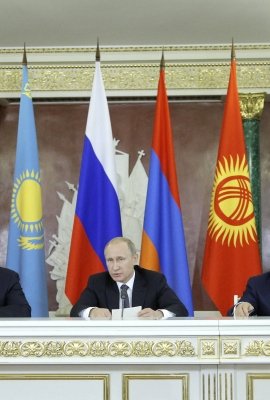Seçkin Köstem
Former George F. Kennan Fellow
Professional Affiliation
Assistant Professor, Department of International Relations, Bilkent University
Expert Bio
Seçkin Köstem is an assistant professor of International Relations at Bilkent University in Ankara. He obtained his Ph.D. degree from McGill University (Montreal, Canada), Department of Political Science. Köstem’s research interests include International Political Economy with a specific focus on regional and rising powers, as well as Russian foreign economic policy, and the post-Soviet space. His doctoral dissertation investigates how national identity conceptions influence foreign economic policies of Turkey and Russia. He has been a visiting researcher at the Russia Institute of King’s College London and the Moscow State Institute of International Relations (MGIMO). Köstem’s articles have been published and forthcoming in Foreign Policy Analysis, Global Policy and Review of International Political Economy.
Wilson Center Project
lmagining Eurasia: Russia's Changing National Economic lnterests
Project Summary
This project seeks to explore Russia's changing national economic interests in the post-soviet period with а specific focus on Eurasian integration. I argue that 'great power nationalism' explains Russia's desire to re-integrate the post-Soviet space and pursue this goal through coercive hegemony. I also explore the roles that Russia has attributed to itself as the dominant economic power in the post-Soviet space. Currently, Moscow's key goal is to use the Eurasian Economic Union as leverage vis-a-vis China's Belt and Road initiative. As the project focuses on the transformation of Eurasian economic integration, it also sheds light on dynamics of conflict and cooperation in Eurasia. Due to its identity based approach, the paper clarifies why Russia has used economic coercion to achieve Eurasian integration.
Major Publications
Frustrated Leadership: Russia’s Economic Alternative to the West, 2016, Global Policy, 7(2), 207-216, with Juliet Johnson.
When Can Idea Entrepreneurs Influence Foreign Policy? Explaining the Rise of the “Turkic World” in Turkish Foreign Policy, 2017, Foreign Policy Analysis, 13(3), 722-740.
Different Paths to Regional Hegemony: National Identity Contestation and Foreign Economic Strategy in Russia and Turkey, forthcoming, Review of International Political Economy
Insight & Analysis by Seçkin Köstem
- Publication
- Governance
Kennan Cable No. 40: Russia’s Search for a Greater Eurasia: Origins, Promises, and Prospects


